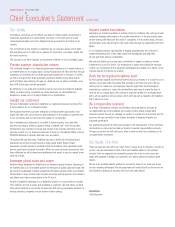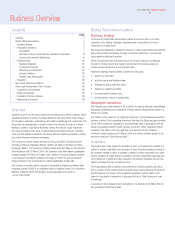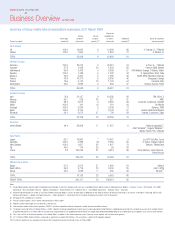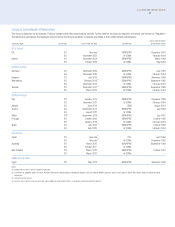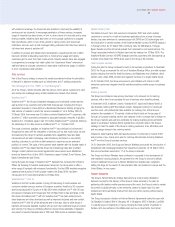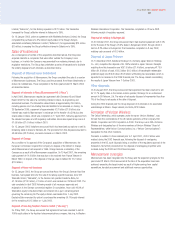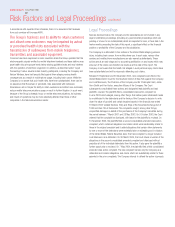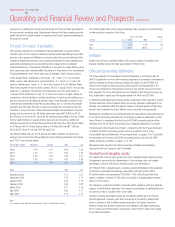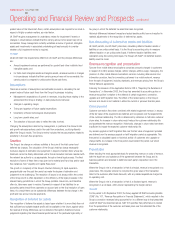Vodafone 2004 Annual Report Download - page 18
Download and view the complete annual report
Please find page 18 of the 2004 Vodafone annual report below. You can navigate through the pages in the report by either clicking on the pages listed below, or by using the keyword search tool below to find specific information within the annual report.
South Africa
The Government published draft communications convergence legislation for
consultation, with a view to finalising new legislation in 2004. Discussions continue on
the permanent allocation of 1800 MHz spectrum to Vodacom. An industry working
group is drafting an Information Communication Technologies Black Economic
Empowerment Charter (“the Charter”) to comply with Broad-Based Black
Empowerment Act 2003 (“BBEE Act”). The Charter, in satisfying the objectives of the
BBEE Act, will set BBEE targets related to company ownership, management,
employment and skills development, procurement, enterprise development, and
residual investment. The Charter is expected to be finalised in June 2004.
Non-mobile Telecommunications
The Group’s non-mobile telecommunications businesses mainly comprise interests in
Arcor, Cegetel and Japan Telecom, until its deconsolidation on 1 October 2003.
Arcor is the second largest fixed line telecommunications provider in Germany. With its
own Germany-wide voice and data network covering more than 40,000 km, Arcor
utilises the latest technologies to offer its customers a full range of services for voice
and data transfer, including complete ISDN/DSL connection services.
Cegetel is France’s second largest fixed line telephony operator and offers a wide
range of fixed line telephone services to residential and business customers as well as
special corporate services ranging from network and customer relations management
to Internet-Intranet hosting services. Cegetel also owns the most extensive private
telecommunications network in France, with 21,000km of fibre optic cable.
History and Development of the Company
The Company was formed in 1984 as a subsidiary of Racal Electronics Plc. Then
known as Racal Telecom Limited, approximately 20% of the Company’s capital was
offered to the public in October 1988. It was fully demerged from Racal Electronics
Plc and became an independent company in September 1991, at which time it
changed its name to Vodafone Group Plc. Following its merger with AirTouch
Communications, Inc. (“AirTouch”), the Company changed its name to Vodafone
AirTouch Plc in June 1999 and, following approval by the shareholders in General
Meeting, reverted to its former name, Vodafone Group Plc, on 28 July 2000.
Acquisitions of businesses
The Group has completed a number of business transactions over the past three
years, the most significant of which were the acquisition of further interests in
Vodafone Japan and Vodafone Spain. In addition, the Group has increased its equity
interests in certain other existing Group companies through a series of transactions.
These transactions are described in more detail below and, when combined with
others, most notably the merger with AirTouch, which completed on 30 June 1999,
and the acquisition of Mannesmann AG (“Mannesmann”) in April 2000, have
increased the geographic footprint and substantially increased the customer base of
the Group’s mobile operations, particularly in Europe and Asia, and have significantly
impacted the results of operations.
Acquisition of additional interests in Vodafone Japan and of
Japan Telecom
The Group’s investment in Japan at 1 April 2001, following the merger with AirTouch
and subsequent transactions and agreements, comprised a 26% stake in J-Phone
Communications Co., Ltd. (“J-Phone Communications”), which had a controlling
interest of approximately 50% in each of the three regional mobile
telecommunications companies, J-Phone East, J-Phone West and J-Phone Central,
collectively known as the J-Phone Group.
Vodafone Group Plc Annual Report 2004
16
Business Overview continued
Asia Pacific
Japan
The NRA has introduced transitional measures to allow fixed network operators to set
retail prices for fixed to mobile calls using the fixed network operator’s override dial
code. Until 31 March 2004, mobile operators set retail prices for fixed-to-mobile calls
(Vodafone Japan’s current retail price is ¥120 per three minutes). Fixed line operators
then deduct a fixed line interconnection charge and billing and collection costs. Since
1 April 2004, a retail price of ¥60 per three minutes has applied to fixed-to-mobile
calls which use a fixed operator’s override dial code, which is a short code which must
be inserted before the telephone number being called. Vodafone Japan will receive a
mobile termination charge of approximately ¥40 per three minutes in respect of these
calls. Vodafone Japan will continue to set the retail price for non-override calls, which
are calls where the override dial code has not been inserted. From 1 April 2005, fixed
operators set the retail price for override calls and mobile operators set the retail price
for non-override calls. Mobile operators will receive a mobile termination charge in
respect of override calls at a level yet to be determined.
The NRA is actively considering the introduction of mobile number portability.
Australia
The Australian Consumer and Competition Commission (“ACCC”), the NRA,
commenced a review of mobile services in March 2003. The review examines what
form of regulation, if any, should be applied to the mobile terminating and originating
access services, domestic and international roaming services and 3G mobile services.
The ACCC has released a draft decision regarding the regulation of mobile terminating
access rates that, if implemented, would see continued regulation of 2G voice
termination services and the extension of that regulation to 3G voice services. The
proposed regulation would require rate decreases of 3 cents per annum (local currency)
each year for the next three years, representing a total reduction of 50% in real terms
during the period to 31 December 2006. A final decision is expected by summer 2004.
New Zealand
The NRA made a determination regarding the calculation and allocation of costs of the
telecommunications universal service obligation in December 2003. In April 2004, the
High Court ruled that, while it would not grant leave to appeal on this occasion,
Vodafone New Zealand was free to take up the matter again with the NRA in the
context of the 2002/03 telecommunications universal cost obligation cost calculation.
The NRA announced, in April 2004, that it would investigate mobile termination rates
and retail prices for fixed to mobile calls. The NRA has yet to announce details of the
timeframe or process for the investigation but it is expected to conclude the
investigation and make recommendations to the Government in November 2004.
China
At the end of 2003, the Ministry of Information Industry announced that the second
phase of 3G external field testing would start in February 2004, with China Mobile
testing W-CDMA, China Unicom testing CDMA2000, and China Telecom testing both
W-CDMA and CDMA2000. All carriers will also test TD-SCDMA in smaller field trials.
There has been no formal announcement of the timing or number of 3G licences to be
issued in China.
Middle East and Africa Region
Egypt
In December 2003, Vodafone Egypt and MobiNil agreed each to pay EGP1,240 million
over a five year period to the NRA in return for access to 1800 MHz spectrum and
other benefits.


